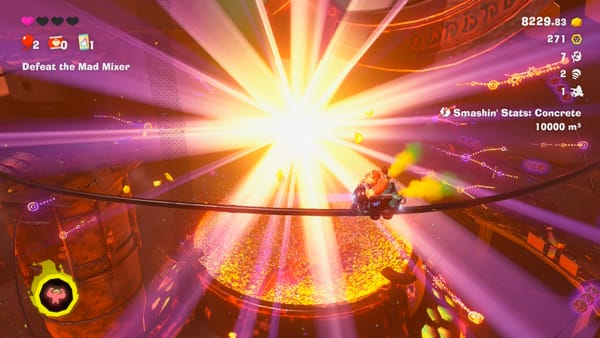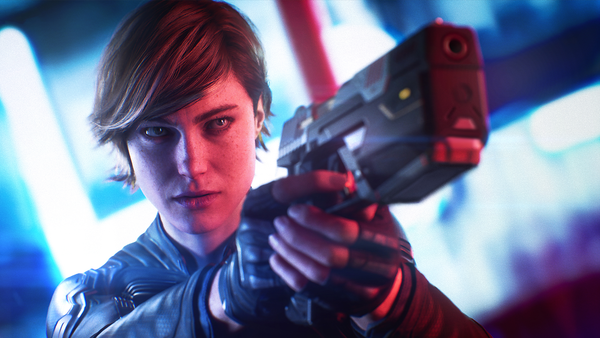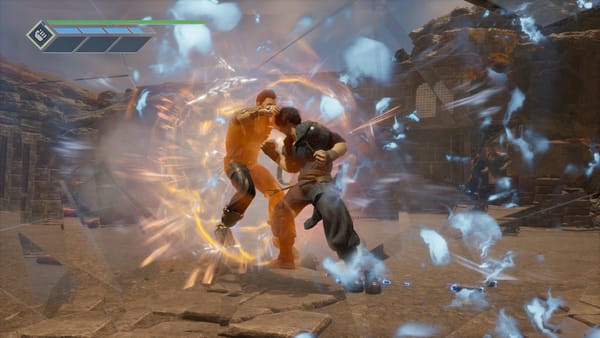#88: Reasons to be cheerful
As the nausea passes — sort of, anyway — let's focus on the positive side of Acquisition Blizzard.

Right! As promised/threatened the other day, today we’ll dispense with the doom-mongering of the week to date, and try to accentuate the positives of Microsoft’s shock acquisition of Activision Blizzard for an eye-watering $68.7bn. (An aside: funny, isn’t it, how frequently that has been expressed in news reports as $70bn. When the numbers are this high, $1.3bn becomes a rounding error. What a world.)
Anyway! Enough of that. There are plenty of upsides to this too. Let us try and end the week on a high note.
First, I’m assuming King is being left largely as it is. It has been largely insulated from the misconduct scandal, and its business appears very healthy. If anything it is the easiest part of the deal to understand — a large, lucrative presence in a market in which Microsoft currently lacks one. Besides, I’m not in an informed enough position to comment on what happens to King after the deal closes. We’ll put COD Mobile to one side too, for similar reasons.
With our terms of reference set, then, it is hard to see this as anything other than a huge improvement for Activision Blizzard staff. Those that were entirely blameless in the misconduct scandal have nonetheless had to work beneath its cloud, to step around the stains while they go about their days. Many of them have spent the months since the news broke calling for change, and this is about as quick and thorough a transformation as they could have hoped for.
Kotick will be gone as soon as the deal closes, pretty much, and I imagine most of his fellow board members — or at least, those who have been caught up in his mess — will follow him out of the door. Once the ink dries, Activision Blizzard staff will be operating within a completely different company which, while far from blemish-free, clearly has a far healthier set of values, and a distinctly less mucky recent past. Despite my reservations about the deal, I am happy for them all. (Those with stock options are quids in, too!)
Activision itself has changed dramatically over the past few years. Back when Eric Hirshberg was running the publishing operation, he decided the best way forward was focusing on a handful of bankers. As he saw it, Activision’s Call Of Duty, Destiny, Guitar Hero and Skylanders, and Blizzard’s World Of Warcraft, would be the forever kings of the ActiBlizz business. That always smelled like a short-term strategy, and so it has proven. Hirshberg is long gone — to embark, as OG Hit Points readers know, on an unlikely career as a singer-songwriter — but his policy has endured, and reached its logical conclusion. Almost all of it has gone. While WOW trundles on, all that the Activision half of ABK has left at this point is Call Of Duty.
Kotick has restructured the entire development operation behind it. Blizzard ended up a casualty of this approach too, as Kotick sought to turn a developer that owed so much of its success to being given time and freedom to experiment into a COD-style hit factory. As such the transfer of power to Microsoft, the financial cushion it provides, and the change in approach afforded by thinking of Game Pass first and sales a distant second, could be of huge benefit to both Activision and Blizzard when it comes to the games they make, and how they make them.
To Blizzard, the benefits are obvious. With Kotick gone and commercial pressures much reduced, the studio can in theory return to its historical production methods, motivated not by impending milestone deadlines but by the quality of its finished products. The sort of Blizzard whose planned WOW follow-up, codenamed Titan, spent several years in a drawer before being transformed into Overwatch, rather than the one blamed for stock fluctuations when it is forced to delay a game. A return to the old ways of patient game development, under a new culture, with the Great Satan and his minions gone? I expect that if you’d offered that to them two weeks ago, the average Blizzard employee would have bitten your hand off.
For the Activision side, yesterday’s Bloomberg report suggests the higher-ups are thinking along a similar line to what I suggested the other day: that the days a new Call Of Duty game being on shelves every November may be over. This could free up the army of support studios — Vicarious Visions, Raven, Toys For Bob et al — that have been pulled in by the COD tractor beam in recent years, allowing them to put their evident talents to more varied, and more creatively fulfilling, work. Coverage of the deal has naturally focused on COD and Blizzard, but to do so is to overlook the many talented and experienced studios that Microsoft is buying.
And what of Call Of Duty itself? For all its success, Warzone has asked a lot of difficult questions about its host series’ future — ones that Activision, as currently structured, is not particularly well equipped to answer. Part of the reason all those support studios have been drafted in is not just about putting a new mainline COD in stores every year, after all: Warzone must be supported at the same time. And despite Warzone — perhaps even because of it — there has been a sense, backed up by sales figures, that COD’s star has been fading for a while. With less sales pressure thanks to Game Pass, Activision now has the chance to reassess what Call Of Duty should look like in Space Year 2022. A COD equivalent of The Master Chief Collection? A standalone, eternally updated Zombies mode? Less of the mechanical and structural gimmickry that’s resulted from the latest game needing to stand apart from its immediate predecessor? Whatever becomes of it, the point is that Call Of Duty — like Activision and Blizzard themselves — has been crying out for sweeping change for years, and the acquisition makes that change possible.
Allen Murray told me a great story about Phil Spencer during our chat for Max HP. Back when Allen was at Bungie, Spencer came to visit while the studio was closing out its work on Halo 3. He’d played the game, and gave a brief speech. “We were so high on our own supply,” Allen told me. “We were so fucking cool; nobody could tell us what to do. There was a lot of attitude and hubris going round. Phil came in and basically said, ‘You’ve made another Halo. That’s great. But that’s what everybody expects you to do. We know you can do that.’” Lots of the Bungie bods were furious, of course, but Allen saw it differently: “What I took from it was, ‘You can do better. You can do more. You can do something amazing.’”
I couldn’t find a way to fit that into the Max HP piece, but I wondered if I’d ever get an opportunity to wheel it out. Feels pretty pertinent now, doesn’t it, as Spencer walks into another company full of talent and ego and historical success — and its own infamous set of problems — and tells them all it’s time they changed gears. I expect this time his audience is a good deal more receptive.
See? It’s not all bad, is it. There is plenty here to celebrate, if only between the waves of nausea. Good stuff.
MORE!
- Phil Spencer says he has had “good calls this week” with the suits at PlayStation, and has “confirmed our intent to honour all existing agreements” between Sony and Activision when the deal finally closes. Lots of people have pointed out that he said similar about the Bethesda buyout, but I remain firmly of the opinion that Warzone, at least, will stay multiplatform. If anything I expect its availability to grow broader, not narrower, when Microsoft assumes control.
- Raven unionised! Oh this is very interesting. The first one ever in big-budget game-making. Over to you, Microsoft.
- If you’re struggling to get your head around the scale of the new-look Xbox operation, behold Eurogamer’s list of every internal studio and what they’re working on. It’s a lot.
- The International Game Developers Association is on the hunt for a new executive director, after Renee Gittins, incumbent since 2019, decided to step down. Hit Points chum Rami Ismail has been appointed to the board to assist in the search for Gittins’ replacement. (A reminder that Rami’s newsletter is essential reading for indie developers, and highly recommended to everyone else.)
- A GDC survey has found overwhelming developer apathy at the prospect of NFTs in games. Over 70% of respondents said they and their studios had no interest in crypto payment methods or NFT item sales. Hurrah. Shoutouts to the anonymous developer — currently working at an NFT game studio! — who said: “Burn 'em to the ground. Ban everyone involved in them.” Cripes.
- TT Games, developer of Lego Star Wars: The Skywalker Saga, is pretty crunchy, per this from Polygon. Astonishingly, this report came out on the same day that The Skywalker Saga’s release date was announced. What are the odds!
- Fortnite is now so big and long-running that it has used up all the actual words, and must now resort to inventing godawful ones.
- I can think of no one better to close out the week than Ken Kutaragi, who dissed virtual reality in his inimitable style when talking to Bloomberg this week. “Being in the real world is very important,” he said, “but the metaverse is about making [things] quasi-real in the virtual world, and I can't see the point of doing it. Headsets isolate you from the real world, and I can’t agree with that. Headsets are simply annoying.” Marvellous.
Share this! Please! I am almost entirely dependent on the people that read and enjoy Hit Points telling other people about their love for it. I’ll make you a deal: if all of you share it today I won’t ask again for a month. And one day, with any luck, I’ll never need to ask at all. Have yourselves an excellent weekend, and I’ll see you all, bright-eyed and bushy-tailed, on Monday.





